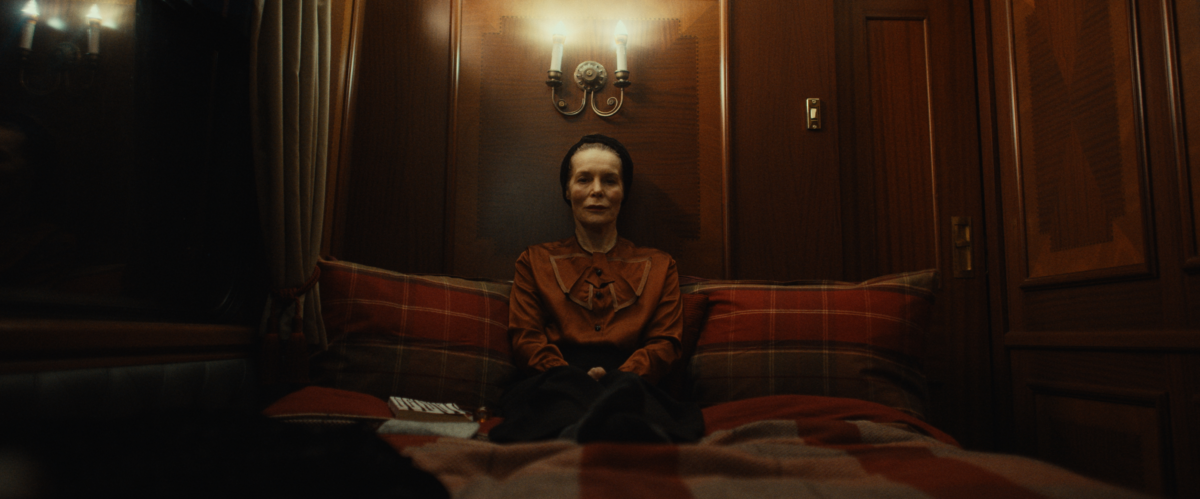The visual atmosphere in the first few minutes of director/co-writer Charlotte Colbert’s She Will is delightfully arresting and heartbreaking. Conjoined with aerial camera shots of forestry landscapes of trees and grass, one woman in a spacious bedroom is staring in a mirror. Veronica Ghent (Alice Krige) is a former film star who just underwent a double mastectomy. As she stars are her frail reflection, the press acts as a blunt-force object, reminding Veronica of her youthful days. She prepares to go to Scotland for what she thinks is a quiet retreat while a young nurse, Desi (Kota Eberhardt), accompanies her.
Veronica’s relationship at first is highly guarded and short — a standoff nature amplified when she finds out the retreat has other vacationers. Tirador (Rupert Everett), an eccentric, hippy, self-declared “feminist,” tries to get Veronica involved in daily talk and painting sessions. Even though he insists, Veronica recoils. When Veronica and Desi move to their isolated, fog-dense cabin, we get more information about the history of the retreat’s ground. Legend says the soil is mixed with the ashes of women burned to their deaths and labeled as witches in 1722.
Colbert and co-writer Kitty Percy mix the macabre undercurrent of She Will with the real-life ramifications of patriarchal abuse and who gets left carrying the bill. While Veronica tries to rectify her pain in solitude while having strange dreams, a director she previously worked with named Eric Hathbourne (Malcolm McDowell) is undergoing a “revival” of sorts. He’s due to be knighted and readying a remake of the film he and Veronica worked on together when she was 13. However, that past is marked by the director’s insistence on having an inappropriate relationship with her.
The film ties together the history of women being persecuted and often forgotten by time. Despite the history, there’s a huge casting call for Veronica’s role because details are unknown to the public. While She Will is not necessarily a horror film in the classic sense, the scariest thing is directors and figures like Hathbourne go without punishment for decades and ruin someone else’s life. Meanwhile, Veronica has to wrestle with the trials of disease in a cruel twist of fate. As Veronica stays longer, the earth calls to her — she looks at sleep to heal the physical and mental ailments that have taken hold of her. Cinematographer Jamie Ramsay uses the story as a playground for psychedelic imagery.
Sometimes the viewer will question reality — even if Veronica awakens to mud-caked hands and feet. Earthly tones, splashes of color, visions of women gathered around a raging fire, and fixations on insects fix with the effective score of Clint Mansell. As all the elements come together, the story is one of the generational links of women who have to “rise from the ashes” of societal despair. With Veronica and Desi, this theme works the best as they grow closer through conversation. Throughout Veronica’s transformation, she allows herself to be vulnerable. Isolation will leave you no choice but to do that. Earlier in She Will, it’s established there’s no cell phone service while at the Scottish village (of course).
Veronica’s story both heeds as a warning and a source of liberation. There’s a side story Desi has with a local man named Keith (Daniel Lapaine) — which makes sense in context, but the overtness takes from the ethereal nature of the film. Story elements aren’t explained, but inferred. It’s the fantastical nature, along with the performance of Krige, that enhances the source material. Iron sharpens iron, and fire serves as a purification agent. Many would say women have been engulfed in the flames of injustice for way too long. She Will provides an instance where the wrong-doers finally feel the heat of that ongoing struggle.
Photo Credit: IFC Midnight













